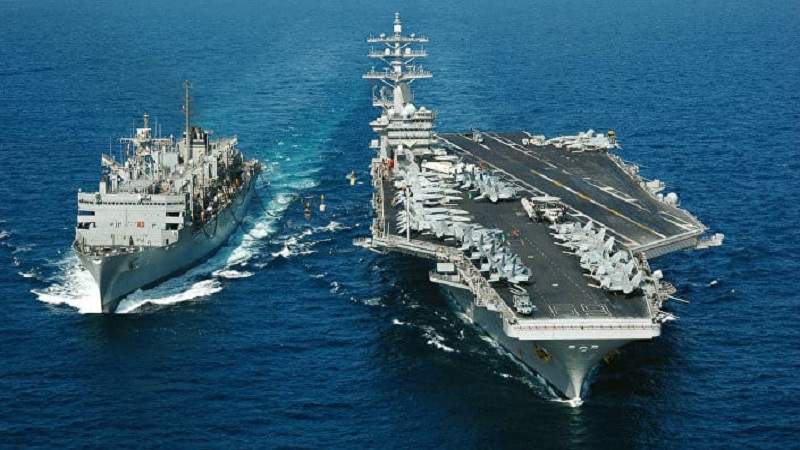US Defeat in Yemen: Withdrawal of USS Roosevelt and the Rising Power of Yemeni Forces

World: In a new display of American defeat in front of Yemen, whose echoes have reverberated globally and within the United States itself, the U.S. aircraft carrier USS Theodore Roosevelt has withdrawn from the region after a deployment lasting about two months.
According to U.S. officials who spoke to the Associated Press on Thursday, the Roosevelt is en route back to the U.S., having entered the area of the U.S. command in the Pacific and Indian Oceans.
Although U.S. officials labeled this move as the “completion of the carrier’s mission,” the actual title should be escape and failure. Since its arrival in mid-July, the Roosevelt maintained the maximum possible distance from Yemen and its operational zone in support of Gaza, moving cautiously through the Gulf of Oman and the far eastern Arabian Sea, despite its announced mission of replacing the fleeing Eisenhower as part of the so-called "Prosperity Guard" coalition, which was supposed to involve its presence in the Red Sea and the Gulf of Aden.
The Roosevelt’s avoidance of the Yemeni operational area throughout its deployment coincided with a complete absence of U.S. and British warships in the Red Sea, reflecting Washington and London’s state of paralysis and fear—observed and described by their own media as an "unprecedented defeat" and "setback," further confirmed by the withdrawal before reaching the mission’s main area.
Considering the significant impact caused by Eisenhower’s earlier retreat, highlighted by the statements of its commanders and officers upon their return from the Red Sea, Roosevelt’s decision to stay far from Yemen’s operational area demonstrates Washington’s recognition of the risks of repeating that experience. It also signifies the failure to control the media narrative, as despite U.S. media focusing on the "safety" of warships returning from the Red Sea, some shocking truths could not be concealed—such as the fact that what they faced in the Red Sea was "unprecedented" and that "traditional deterrence policies" cannot be applied against Yemen, according to the Fifth Fleet Commander. Hence, Roosevelt stayed away and returned to avoid worsening the situation.
Roosevelt's withdrawal from the region is not the only manifestation of U.S. defeat against Yemen. U.S. Secretary of State Antony Blinken recently admitted that reaching a ceasefire agreement in Gaza is the path to "calming things in the Red Sea," a clear acknowledgment of the failure of military efforts to hinder and stop Yemeni operations supporting Gaza. It also reflects the failure of political and economic pressure tactics that Washington had attempted, such as hindering peace agreements with Saudi Arabia and escalating the transfer of banks from Sana’a.
In addition to Roosevelt’s retreat and Blinken's acknowledgment, the ongoing economic consequences of Yemeni operations continue to highlight U.S. and broader Western defeat. Several British media outlets recently reported that the U.K.'s supply chain is experiencing unusual disruptions ahead of the "Christmas season," as retailers rush to stock up before the season begins, bearing high costs to avoid delays caused by rerouting British ships around the Cape of Good Hope. They are also trying to preempt further increases in shipping prices, which have already more than tripled, according to Britain’s The Times newspaper.
The British supply chain website Supply Chain 360 commented, saying that "the situation in the Red Sea is reshaping U.K. retail," while the British Telegraph linked the disruption directly to the failure to deter Yemen's armed forces, sarcastically adding, "If the toy warships are delayed, it's because we don't have enough real warships."
In a related development, Conbulk Ship Management, the owner of the Groton vessel targeted twice by Yemeni forces in August, announced that it would stop sending its ships through the Red Sea. This marks another success in enforcing the blockade on ships that violate the ban on reaching Israeli ports, serving as further evidence of U.S., British, and Western failure to take any meaningful action.
Moreover, the British maritime newspaper Lloyd’s List recently reported that ships connected to Israel, the U.S., and Britain now find it "impossible" to cross the Red Sea. These ships not only face a significant rise in war risk insurance premiums but also the fact that insurance for these vessels is no longer available, as companies refuse to cover them to avoid significant losses from compensating for damages.
Added to these outcomes is the fact that Yemeni forces have managed to shoot down nine advanced U.S. MQ-9 drones, totaling nearly $290 million in value, in less than a year. At the same time, the U.S. Navy had spent $1.16 billion on munitions in its confrontation with Yemen by mid-July, according to an American military spokesman who spoke to Business Insider recently. These numbers correspond with no notable achievements in the U.S.’s stated objectives of deterring Sana’a and halting Yemeni operations supporting Gaza, classifying them as direct losses.
In summary, American and British media references to "defeat" and "setback" in the face of Yemen are not just sensational headlines but direct and objective descriptions of a measurable and observable geopolitical, military, and economic reality—a reality shaped by Yemen’s armed forces, one that will persist and lay the foundation for new historical transformations.
-
04:31
Palestinian sources: Over 40 martyrs, many injured as a result of enemy airstrikes on the Gaza Strip since dawn today
04:31
Enemy media: "The Israeli army" and "the security establishment" admit that fighting the Houthis is complicated due to the difficulty of gathering intelligence
02:22
Armed Forces: We confirm our continued support for the Palestinian people until the aggression on Gaza stops, the siege is lifted.
02:22
Armed Forces: We warn the Israeli, American enemy against aggression on Yemen, affirm our full right to defend the country.
02:22
Armed Forces: We reiterate our readiness to confront any American, British, or Israeli folly in the coming period.





